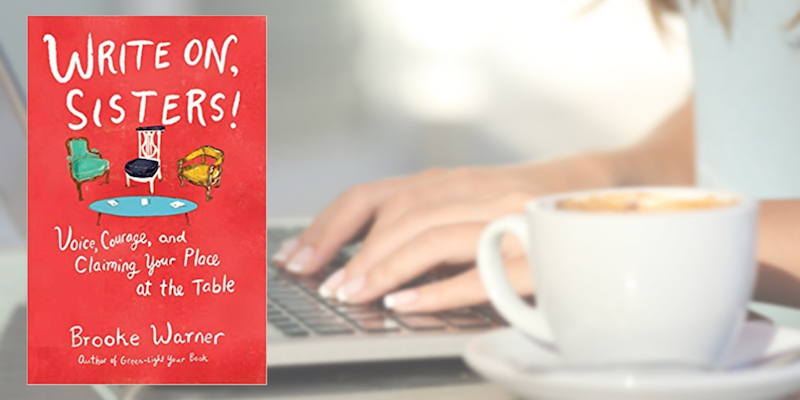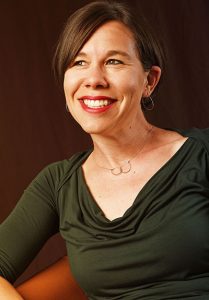
If you’re a woman who wants to write a book, or if you want to support a woman on this path, pick up a copy of Write On, Sisters! Voice, Courage, and Claiming Your Place at the Table by Brooke Warner.
Brooke Warner has spent 15 years publishing books by women authors, first at Seal Press, then as co-founder and publisher at She Writes Press, a hybrid publishing house with a solid reputation.
If you’ve seen her TEDx talk on green-lighting your creative life, you’ll know to expect a clear-eyed assessment of the publishing industry combined with words of encouragement.
(If you haven’t seen the talk yet, go watch it. I’ll wait.)
The experience of publishing can be quite different for women than men. Not only are systemic biases built into the publishing industry, but women also face years of social conditioning that may prevent them from getting their ideas out into the world. This book laid out these many obstacles and offers sound advice for handling them.
Because the book resonated so much with my experience and observations, I contacted Brooke to ask her about the book. Here’s a quick summary of our conversation. (My questions are in bold.)
An Interview with Brooke Warner of She Writes Press
 AJ: Why write a book specifically about publishing for women? What’s different for women?
AJ: Why write a book specifically about publishing for women? What’s different for women?
BW: I’ve been working in women’s publishing since 2004, so I’ve noticed a lot of things over the years that are unique to female authors, and I wanted to share those observations in this book.
From my time at Seal Press, I understood the psychological barriers and social issues around being a female author. And then She Writes Press exposed me to another layer of financial barriers, because authors subsidize their own projects. In my experience, men don’t struggle to authorize themselves and their projects in the same way.
You write about the Impostor Syndrome, or the sense people have of being a fraud. Do you feel that women are more prone to experiencing the Impostor Syndrome in a way that prevents them from writing or publishing?
I do think women are more susceptible to acting on the impulses of the Impostor Syndrome. Men are conditioned to feel comfortable with the “fake it till you make it” approach. Our society encourages men to get out there and do it. That’s not as true for women.
This relates to the problem that women don’t resubmit their work as often as men. Traditional publishing is filled with rejection. When men submit a manuscript and it’s turned down, they tend to not take it personally. They rework and resubmit. Women, however, often personalize rejection.
By writing this book, I hope to make women aware of their psychological and social conditioning so they can stop responding in limiting ways.
How do you recommend that women authors address their fears and enhance their confidence?
It’s hard to tell people to be more confident. The best thing women can do is to feel the pain and write and publish anyway, and hopefully feel less pain the next time around.
We also have to build up self-protection mechanisms to deal with detractors and critics.
For example, I wrote an article for Salon recently, and the trolls came out in force in the comments. I allowed myself to stop reading the comments. One of my authors sent me a message on Facebook to share that she’d had a similar experience on another outlet, but she kept reading the comments, until she finally asked the site to take her piece down.
We have to find ways to protect ourselves and to rise above the negativity, even if that means putting parameters around what we’re willing to absorb.
It’s important that women do this for the same reasons that it matters that we have diverse voices in Congress. I think about how our children are growing up and what they see represented. Women’s voices need to be out there as a model so young people normalize it.
Nonfiction authors need to adopt an authoritative writing voice. How do you advise women who struggle with finding an authentic yet authoritative voice?
I encounter this issue when I teach memoir writing. I stress to memoir authors the importance of reflecting and making universal conclusions from their experiences. Women will worry often about being preachy, or say, “I don’t have the authority or expertise.” Social and psychological conditioning can hold us back in this way.
Beyond that, women’s speech patterns can be problematic. Qualifying words and phrases drive me crazy. I’m prone to editing out any form of qualification because it sounds like an apology, and makes women writers seem less authoritative.
You’ve spoken eloquently about “green-lighting” a creative life, and you run a hybrid press that helps women do just that. Yet as an indie author, I’m aware of people who scoff at the green-lighters. Do you have any advice for dealing with them?
Some people don’t see the value in green-lighting, but then change their minds when they run into high barriers to traditional publishing that exist today.
I have worked with countless authors who were dead set on traditional publishing. Then they realized that it wasn’t going to be their destiny. People either kick and scream, or they change their tune and say, “I am going to say yes to myself.” These are the people who become green-lighters. They make room for a new dream.
Need more encouragement?
Let me repeat two quotes from Write On, Sisters that may inspire you:
Few events are more life-changing and soul-affirming than offering up your work in the form of a published book.
And, at the end of the book:
Remember this: real power comes from authenticity of expression and incremental, small actions that effect change. No one determines who’s deserving in this life, so you’ve just gotta reach out and grab hold of the belief that you are. Big enough is a state of mind.
I could go on, but the book speaks for itself. Read it, and get writing.
Order the book from BookShop.org
Related posts
If you enjoyed this book, you might also like my review of these books: